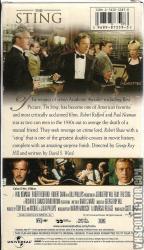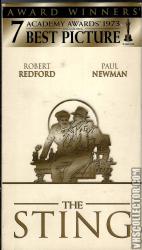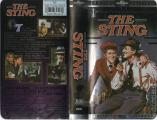The Sting
Catalog Number
87359
-
Primary Distributor (If not listed, select "OTHER")
Catalog Number
87359
Primary Distributor (If not listed, select "OTHER")
Release Year
Country
N/A (NTSC)
N/A | N/A | N/A
N/A | N/A
The Sting (1973)
Additional Information
Additional Information
...all it takes is a little Confidence.
Four years after setting box offices ablaze in Butch Cassidy and the Sundance Kid, Paul Newman, Robert Redford, and director George Roy Hill re-teamed with similar success for The Sting. Redford plays Depression-era confidence trickster Johnny Hooker, whose friend and mentor Luther Coleman (Robert Earl Jones) is murdered by racketeer/gambler Doyle Lonnegan (Robert Shaw). Hoping to avenge Luther's death, Johnny begins planning a "sting" -- an elaborate scam -- to destroy Lonnegan. He enlists the aid of "the greatest con artist of them all," Henry Gondorff (Paul Newman), who pulls himself out of a drunken stupor and rises to the occasion. Hooker and Gondorff gather together an impressive array of con men, all of whom despise Lonnegan and wish to settle accounts on behalf of Luther. The twists and surprises that follow are too complex to relate in detail -- suffice to say that you can't cheat an honest man, and that you shouldn't accept everything at face value. The Sting became one of the biggest hits of the early '70s; grossing 68.5 million dollars during its first run, the film also picked up seven Academy Awards, including Best Picture, Best Director, Best Screenplay, and Best Adapted Score for Marvin Hamlisch's unforgettable setting of Scott Joplin's ragtime music. ~
The Sting is a 1973 American caper film set in September 1936 that involves a complicated plot by two professional grifters (Paul Newman and Robert Redford) to con a mob boss (Robert Shaw).[3] The film was directed by George Roy Hill, who previously directed Newman and Redford in the western Butch Cassidy and the Sundance Kid. Created by screenwriter David S. Ward, the story was inspired by real-life con games perpetrated by the brothers Fred and Charley Gondorff and documented by David Maurer in his book The Big Con: The Story of the Confidence Man.
The title phrase refers to the moment when a con artist finishes the "play" and takes the mark's money. If a con is successful, the mark does not realize he has been "taken" (cheated), at least not until the con men are long gone. The film is divided into distinct sections with old-fashioned title cards with lettering and illustrations rendered in a style reminiscent of the Saturday Evening Post. The film is noted for its anachronistic use of ragtime, particularly the melody "The Entertainer" by Scott Joplin, which was adapted for the movie by Marvin Hamlisch (and became a top-ten chart single for Hamlisch, when released as a single from the film's soundtrack). The film's success encouraged a surge of popular and critical acclaim for Joplin's work.[4]
The Sting was hugely successful at the 46th Academy Awards, being nominated for 10 Oscars and winning seven, including Best Picture, Best Director, and Best Original Screenplay.
Release Date: December 25, 1973
Distrib: Universal
Boxoffice: $156,000,000 2013: $707,794,300
Four years after setting box offices ablaze in Butch Cassidy and the Sundance Kid, Paul Newman, Robert Redford, and director George Roy Hill re-teamed with similar success for The Sting. Redford plays Depression-era confidence trickster Johnny Hooker, whose friend and mentor Luther Coleman (Robert Earl Jones) is murdered by racketeer/gambler Doyle Lonnegan (Robert Shaw). Hoping to avenge Luther's death, Johnny begins planning a "sting" -- an elaborate scam -- to destroy Lonnegan. He enlists the aid of "the greatest con artist of them all," Henry Gondorff (Paul Newman), who pulls himself out of a drunken stupor and rises to the occasion. Hooker and Gondorff gather together an impressive array of con men, all of whom despise Lonnegan and wish to settle accounts on behalf of Luther. The twists and surprises that follow are too complex to relate in detail -- suffice to say that you can't cheat an honest man, and that you shouldn't accept everything at face value. The Sting became one of the biggest hits of the early '70s; grossing 68.5 million dollars during its first run, the film also picked up seven Academy Awards, including Best Picture, Best Director, Best Screenplay, and Best Adapted Score for Marvin Hamlisch's unforgettable setting of Scott Joplin's ragtime music. ~
The Sting is a 1973 American caper film set in September 1936 that involves a complicated plot by two professional grifters (Paul Newman and Robert Redford) to con a mob boss (Robert Shaw).[3] The film was directed by George Roy Hill, who previously directed Newman and Redford in the western Butch Cassidy and the Sundance Kid. Created by screenwriter David S. Ward, the story was inspired by real-life con games perpetrated by the brothers Fred and Charley Gondorff and documented by David Maurer in his book The Big Con: The Story of the Confidence Man.
The title phrase refers to the moment when a con artist finishes the "play" and takes the mark's money. If a con is successful, the mark does not realize he has been "taken" (cheated), at least not until the con men are long gone. The film is divided into distinct sections with old-fashioned title cards with lettering and illustrations rendered in a style reminiscent of the Saturday Evening Post. The film is noted for its anachronistic use of ragtime, particularly the melody "The Entertainer" by Scott Joplin, which was adapted for the movie by Marvin Hamlisch (and became a top-ten chart single for Hamlisch, when released as a single from the film's soundtrack). The film's success encouraged a surge of popular and critical acclaim for Joplin's work.[4]
The Sting was hugely successful at the 46th Academy Awards, being nominated for 10 Oscars and winning seven, including Best Picture, Best Director, and Best Original Screenplay.
Release Date: December 25, 1973
Distrib: Universal
Boxoffice: $156,000,000 2013: $707,794,300
Related Links
Related Releases2
Catalog Number
83940
Primary Distributor (If not listed, select "OTHER")
The Sting (1973)
Release Year
Catalog Number
83940
Primary Distributor (If not listed, select "OTHER")
Catalog Number
83940
Catalog Number
66009
Primary Distributor (If not listed, select "OTHER")
The Sting (1973)
Release Year
Catalog Number
66009
Primary Distributor (If not listed, select "OTHER")
Catalog Number
66009











Comments0
Login / Register to post comments